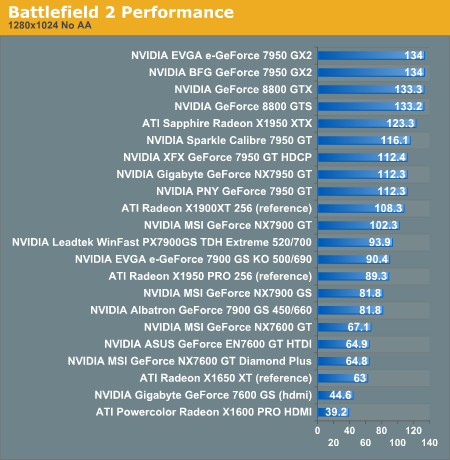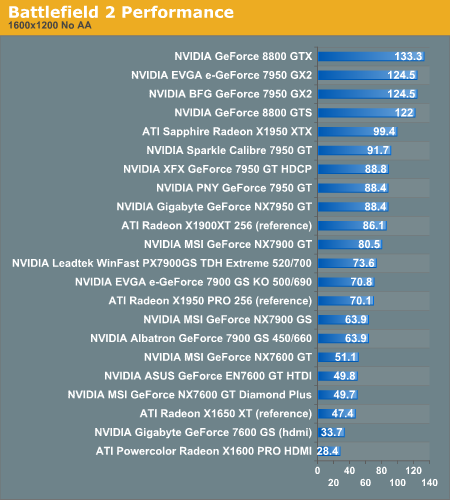NVIDIA and ATI HDCP Compatible Graphics Cards Roundup
by Josh Venning on November 16, 2006 12:00 AM EST- Posted in
- GPUs
Battlefield 2 Performance
Battlefield 2 is a standard performance test we use here at AnandTech, and the game is still a very popular one, in spite of the recent release of the newest installment of the Battlefield series: Battlefield 2142. We like the graphics and physics engine of Battlefield 2, and we also find the game play highly addictive, even if load times can get somewhat lengthy when trying to enter a game.
The benchmark we have consists of a recorded demo of a third-person view of a character in a battle; running, shooting, and riding various vehicles including a jet. The benchmark captures a wide range of gaming and graphics styles from BF2, including effects such as explosions and flying debris. This provides us with frame rates which resemble actual game play as closely as possible.


The first thing we notice is that the BFG and EVGA 7950 GX2 are the overall performance leaders out of all of the cards. Without AA enabled Battlefield 2 is very cpu limited, which is why we see slightly lower performance with the 8800s than the 7950 GX2 at 1280x1024 resolution. At 1600x1200 the results look more like you would expect, with the 8800 GTX higher than the 7950 GX2 by about 10 fps. As you increase resolution, detail and AA settings, the 8800 will separate itself from the pack as we saw in our launch review.
In general, the next highest performer after the 7950 GX2 is the ATI Sapphire X1950 XTX, and Battlefield 2 gets very high frame rates in both resolutions with this card. A couple of other noteworthy performers are the Sparkle Calibre 7950 GT and the Leadtek WinFast (X7900 GS TDH Extreme. Both of these cards have decent factory overclocks, which give a boost in performance over the others in their class. The two lowest performers of the group are the Gigabyte 7600 GS HDMI and the Powercolor X1600 PRO, with the Powercolor card being the lowest performer of the group. All of these cards get playable frame rates in this game at 1280x1024, but the Powercolor X1600 PRO is the only card here that might be a little choppy at 1600x1200.
Battlefield 2 is a standard performance test we use here at AnandTech, and the game is still a very popular one, in spite of the recent release of the newest installment of the Battlefield series: Battlefield 2142. We like the graphics and physics engine of Battlefield 2, and we also find the game play highly addictive, even if load times can get somewhat lengthy when trying to enter a game.
The benchmark we have consists of a recorded demo of a third-person view of a character in a battle; running, shooting, and riding various vehicles including a jet. The benchmark captures a wide range of gaming and graphics styles from BF2, including effects such as explosions and flying debris. This provides us with frame rates which resemble actual game play as closely as possible.


The first thing we notice is that the BFG and EVGA 7950 GX2 are the overall performance leaders out of all of the cards. Without AA enabled Battlefield 2 is very cpu limited, which is why we see slightly lower performance with the 8800s than the 7950 GX2 at 1280x1024 resolution. At 1600x1200 the results look more like you would expect, with the 8800 GTX higher than the 7950 GX2 by about 10 fps. As you increase resolution, detail and AA settings, the 8800 will separate itself from the pack as we saw in our launch review.
In general, the next highest performer after the 7950 GX2 is the ATI Sapphire X1950 XTX, and Battlefield 2 gets very high frame rates in both resolutions with this card. A couple of other noteworthy performers are the Sparkle Calibre 7950 GT and the Leadtek WinFast (X7900 GS TDH Extreme. Both of these cards have decent factory overclocks, which give a boost in performance over the others in their class. The two lowest performers of the group are the Gigabyte 7600 GS HDMI and the Powercolor X1600 PRO, with the Powercolor card being the lowest performer of the group. All of these cards get playable frame rates in this game at 1280x1024, but the Powercolor X1600 PRO is the only card here that might be a little choppy at 1600x1200.










48 Comments
View All Comments
rnemeth - Friday, December 1, 2006 - link
I personally think this article was extremely on point with the direction of media components in general. I think there will be many people out there, like me, who are planning on the convergence of the Media Center PC & Gaming PC. Vista (Ultimate) will bring Media Center to the masses and why shouldn't you be able to play your favorite DX10 "Game for Windows" on your big HDTV as well?
This article is ahead of its time. HDPC/DRM/HDMI/DVI/BR/HD-DVD/HDTV is all in the early stages. In the future, you will be able to buy or rent your high-def movie by downloading it to your PC with DRM finally figured out. This review shows us that it is not all there yet, but gives us an idea who is doing what, and what we need to look for.
You mentioned in the beginning of the article that you were looking for feedback to see how interested your audience is on this subject... count me as 1.
thejez - Sunday, November 26, 2006 - link
HDCP is a joke... look at how hard it is to understand and get this stuff running... not to mention you have upgrade all your hardware?? lol and who watches movies on their PC anyway?? do you people really sit huddled over your keyboard watching movies?? Why not invest in some better equipment for the family room and watch movies they way they were intended....but the difficulty in setting all this up makes it even more important that hdcp has already been cracked... i wouldnt let the movie industry tell you your hardware isnt good enough to buy their content... just buy what you want and "work" around the issue later... the cracks are only getting better.... we'll see HD-DVD Shrink soon enough...
KalTorak - Monday, November 20, 2006 - link
Careful - it's not safe to assume that higher bitrate content is more computationally difficult to decode than lower bitrate content. [In fact, I suspect they're weakly correlated the other way - lower bitrate is harder.]DerekWilson - Monday, November 20, 2006 - link
ahh ... very interesting ...it would make sense to me to say that both are true.
In the case where low bitrate means more aggressive high quality encoding, i absolutely see your point. But low bitrate can also mean lower quality (less information) at the same level of encoding -- in these cases lower bitrate will be easier to decode.
Thanks for pointing this out.
Badkarma - Monday, November 20, 2006 - link
Hi Derek,Can you comment on HD audio formats like Dolby TrueHD and DTS-HD for the HTPC? I know Bluray has yet to use these formats but how about HD-DVD on the HTPC. From what I understand, you could get these formats outputted via analog output on your soundcard, but I'm interested in HDMI. I know some of the HDMI video cards you reviewed have SPDIF passthrough via HDMI, however SPDIF cannot carry Dolby Digital +, TrueHD, or DTS-HD, it will only output DTS or DD. I'm holding back on a HDCP video card because HD audio is an important part of HD movies.
Thanks.
Ajax9000 - Sunday, November 19, 2006 - link
p.13 "Both the 8800 GTX and GTS are fully HDCP compatible, and HDCP is enabled through both DVI ports" p.22 "Some of the cards, like the HDMI Gigabyte 7600 GS and ASUS EN7600 GT, were only able to play our Blu-ray movies over HDMI and not through the DVI port. Conversely, we found that with our MSI NX7600 GT Diamond Plus, the Blu-ray content wouldn't play through the HDMI connection but it would through the DVI port."OK, so which cards (other than the 8800s) could do HDCP over both ports?
----
p.19 "The end result is that an NVIDIA card with more pipelines that is better at 3D performance will not necessarily be better at video decoding."
In other words overclocking (say) a 7600 is likely to give as good or better HD video results than using (say) a 7950GX2?
----
p.20 "In the future, we could see power consumption go down with acceleration enabled. As graphics hardware is better suited to processing video than a CPU, efficiency should go up when using hardware acceleration."
The results for the 9750GTs already seem to show this 147W average non-accelerated >> 142 for EVGA & PNY (although Gigabyte > 148W).
Adrian
chucky2 - Friday, November 17, 2006 - link
...can we get it added to these results just for comparison?Also, you don't happen to know when that'd be, would you? :)
Chuck
BigLan - Friday, November 17, 2006 - link
I noticed that in the cpu utilisation tests you said it was around 51% for no acceleration - was this because the player software is single threaded and so only used one core?Also, is click encoded in h264, or mpeg2 like the initial bluray discs?
DigitalFreak - Friday, November 17, 2006 - link
Now that the Xbox 360 HD-DVD drive is available and is proven to work with a PC, any chance on doing another round-up "real soon now" using HD-DVD? I'd really love to see the numbers for VC1 and H.264 decoding.Still amazed that the lowly X1600 card spanked all Nvidia cards but the G80 boards in CPU utilization.
Good job guys.
DigitalFreak - Friday, November 17, 2006 - link
BTW, the new releases from Fox on Blu-Ray use the H.264 codec. Behind Enemy Lines, Fantastic 4, etc. I think Behind... is already out.